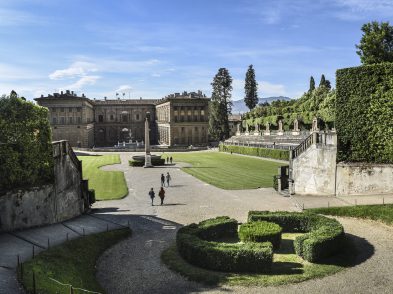On March 8, we mark International Women’s Day, a day of global celebration for the economic, political and social achievements of women past, present and future. In an effort to celebrate this event, we gathered a panel of some our professional women friends in the Anglo community (see box) for a two-part article addressing a variety of issues facing our city.
To kick-off 2009, The Florentine posed a series of questions we would like to probe over the course of the year, with topics ranging from local politics to tourism, the economy, culture and livability. We put these questions and more to our panel, who answered in an open and honest way.
In this first installment we talk to our panel about issues specific to women in our city. We discuss comparisons of womanhood here and in their home countries, making connections with other women-ex-pats and locals alike-and what they feel are women’s most pressing concerns in Florence today. Their answers are articulate and thought-provoking, providing insights into the various layers that make up the life of a woman who chooses to live abroad.
OUR PANEL
Caroline Elo, Hungarian-born American, assistant to the director, Syracuse University in Florence, in Florence for three years
Melinda Gallo, American, writer and web developer, in Florence for six years
Natasha Garland, American writer currently serving as marketing, PR and attaché services director for Palazzo Tornabuoni, seven years in Florence
Sarah Davies, UK, financial analyst, in Florence for nine years
Jo-Ann White, American, retail executive for Burberry, 20 years in Florence
Rachel Whittington, American, executive assistant, in Florence for 18 years
ON BEING A WOMAN IN FLORENCE
When our panel members were asked whether they feel different being a woman in Florence as opposed to their home country, the answer was a resounding ‘yes!’ that crossed country of origin and other aspects of background.
However, most noted that the difference they notice is an Italian, not Florentine, phenomenon. Many felt the difference most in the workplace, where they find sexual harassment and gender discrimination rampant. ‘Italy has a long way to go to increase opportunity for women and to be sensitized to gender discrimination,’ commented Jo-Ann.
On a similar note, Caroline commented that men tend to make value judgments based initially on looks, rather than merit.
Sarah said that she feels less empowered in Italy than she does in her native Britain, and now that she is expecting her first child, she has been surprised at how pregnancy is treated here: ‘Most Italians were surprised that I was working in my first trimester, let alone now during my third. They tend to view pregnancy as akin to an illness and I have to frequently defend my actions and behavior, which have often proven incomprehensible to locals.’
Natasha thinks it is a particularly exciting time to be a woman in Florence: ‘By nature, women are well-adapted for innovation and change, and it feels like this is a big moment of change in Florence.’ While professionally, men still hold the higher positions in business and government, Natasha is convinced that will change as capable women step up to the challenge. On the whole, she prefers the clearer gender distinction in Italy, though occasionally caught short by outdated customs: ‘When my partner asked me if I would iron his shirts, I asked him if he’d ever wondered why I wear only knits.’
Melinda remarked on how womanly Florence makses her feel: ‘In Florence I am able to fully embrace being a woman. Here I don’t need to make excuses for being nurturing, sensual, emotional, assertive, passive, and even complicated. A woman can be a woman, and it is an asset not a handicap.’
ON MAKING CONNECTIONS
There is no doubt that one of the most challenging and exciting things about living abroad is making connections with locals as well as members of the ex-pat community. Connections and friendships among women often play an important role in integrating into a new society. Most of our panelists mentioned the workplace as the primary source of female friendships. Others made connections through social networking groups or through their children’s school.
When asked whether, in spite of their many years of permanent living, they still felt disconnected from ‘the locals’, the women gave varied answers. Some do not feel any sort of distance between themselves and Florentines and, like Melinda, are quite comfortable in taking their time in forming relationships: ‘I know that it takes time to cultivate relationships, and I’m never in a rush to create bonds with people. I let them develop naturally at whatever pace is necessary and comfortable.’
Many who do feel a certain distance between the two communities relate it to cultural differences rather than gender. Sarah, for example, has little or no connection to Florentine women: ‘From the moment I got here nine years ago, I have never managed to successfully socialize with them. I believe this is a peculiarity of Florentines though, being closed and resistant to new friendships, especially with foreigners. It’s been their nature for hundreds of years to physically build walls to protect their city from invaders and currently I feel that the tourist population is so huge that most Florentines cannot distinguish between a foreigner just passing through and someone who wishes to make roots and contribute to their society in a positive, lasting manner.’
Jo-Ann has learned a great deal from her relationships with locals and from living in Florence, but has realized that cultural exchange can only go so far: ‘Living in Italy has made me a more interesting person, but it has not made me Italian.’
Like many ex-pats seeking to assimilate into their new culture, Natasha initially felt ‘bad’ sticking to mostly Anglo friends as she felt is was a sign of not properly integrating with the locals. With time, however, she has cultivated a deep appreciation for the international community in Florence: ‘Ex-pats are different from locals in one important way-they choose to be here. The decision to up and leave wherever you are from and move to Florence, for whatever reason, already assumes there is a certain amount of adventure or openness. Since Florence is not a place that offers wild and exciting nightlife and is certainly missing the “resort” feel, it attracts a particularly interesting group of internationals. It is a place for the curious, for the individual that wants to grow and explore.’
ON WOMEN’S ISSUES
What are the biggest issues facing women in Florence? According to our panel, there is no set answer though the issues are many.
Melinda puts safety at the top of her list: ‘There are times when I’m walking down a street in the early evening and I don’t feel safe.’
Caroline and Natasha both noted childcare among the top concerns for women in Florence. It is often a double-edged sword, with lower salaries affecting what parents can pay for childcare, well as school hours and schedules hindering working parents. As Caroline noted, ‘Salaries in Italy are below the European average and what’s more, Italian schools are closed many months a year, forcing us to enlist help from in-laws or find alternative solutions.’ Natasha echoed those sentiments: ‘My guess is that most women are caught trying to bridge the gap between some antiquated systems and the reality of life today. One example that has affected me personally is the business of school finishing at 1pm. Unless there are grandparents living nearby (who are not still young and vibrant and living their own lives), it makes it very hard for a woman to pursue any kind of professional situation if she has children.’
For others, the major issue facing women in Florence is actually a national problem. Rachel commented: ‘While the glass ceiling has been shattered in many EU countries, Italy is not one of them. Very few women make it to the top in politics, business or as heads of institutions-most jobs on offer are traditional pink-collar labor. Women are not taken seriously and ad campaigns and television programs continue to aggravate the situation. Half-naked women on game shows and talk shows, the exploitation of women’s bodies to sell unrelated products-these are still issues in Italy, and they affect us all.’
Sarah agrees that women are noticeably absent from politics and important managerial positions.
‘We need to increase women’s public profile. For example, I love the fact that Florence has an extraordinarily high number of female museum directors-this is a huge step in the right direction. However, things like this need to be better publicized: How many people in Florence are aware of that fact? Everyone should know about it.’ She also noted the denigrating images of women in the media and decried the number of intelligent women role models: ‘Italian girls and teenagers definitely need more strong role models like Michelle Hunziker and Mariastella Gelmini. What we really need is an Italian Angela Merkel or Margaret Thatcher, a Hilary Clinton, an Oprah, a Cathy Freeman…’
Interestingly, Jo-Ann finds the Italian language is women’s biggest issue: ‘It may sound silly, but I think that the Italian language itself, with its automatic gender identification perpetuates the concept of women as the second sex: there is no chance for me to be a person doing a job, I am a woman doing a job. There is no chance for a women to simply be a lawyer, she is a female lawyer. There is no equivalent of “Ms.” in Italian-all women are identified as either single or married, while this is not the same for men. These are but indicators of larger challenges.’
Read Part II: Our panel fields questions about local politics, tourism, the economy, culture and more.








